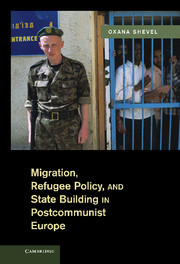5 - The Czech Republic
Published online by Cambridge University Press: 25 October 2011
Summary
This chapter and next analyze refugee policies in the Czech Republic and Poland, respectively – the two uncontested postcommunist states in our study where the politics of refugee policy differs from the politics of refugee policy in both contested postcommunist states and in western states. Unlike contested postcommunist states, the uncontested ones largely resolved the national question before the emergence of refugee issue in the postcommunist period. Thus, the politics of national identity did not impinge on refugee politics as it did in contested postcommunist states. At the same time, because of the novelty of refugee problem, most political and institutional factors at play in western contest (such as parties, interest groups, and courts) were also barely, if at all, relevant. Under these conditions, the preferences of refugee policy elites become the main domestic source of refugee policies. Elite preferences play such a key role because the refugee policy–making elites in uncontested postcommunist states are highly autonomous – constrained by neither party politics and interest groups, nor legislative and institutional legacies as they are in western states, nor by the politics of national identity as they are in contested postcommunist states. Strategies of the UNHCR were the second key variable influencing refugee policies in uncontested postcommunist states. The specific strategy of importance is legislative lobbying. As the legislators are novices in the area of refugee protection, the UNHCR could potentially shape their preferences through lobbying. This, in turn, could bring about liberalization of restrictive refugee policies pursued by the executive. This chapter demonstrates how the two causal factors – preferences of the executive refugee policy elites and legislative lobbying by the UNHCR – shaped refugee policies in the Czech Republic in the postcommunist era.
Czech Refugee Policy Elites
The formation of Czech (until 1993, Czechoslovak) refugee institutions began shortly after the Velvet Revolution that ended communist rule in Czechoslovakia in November 1989. The nature of the Czech refugee policy bureaucracy was affected by both the nature of regime transition (which, in turn, was affected by the nature of the Czechoslovak communist system), and by more idiosyncratic factors. The Czechoslovak brand of communism was one of the most repressive in Eastern Europe. In contrast to Poland and Hungary, Czechoslovakia was not de-Stalinized after Stalin’s death in 1956. In August 1968, the Soviet-led Warsaw Pact invasion crushed the short-lived “Prague Spring” – a domestic reform movement initiated by Alexander Dubček, a reformist First Secretary of the Czechoslovak Communist Party. The “normalization” period after the Soviet invasion made the Czechoslovak regime in the 1970s and 1980s one of the most oppressive in the communist block. Unlike in Poland, the regime in Czechoslovakia did not negotiate with the domestic opposition, Charter 77 dissident movement. As one commentator put it, the Czechoslovak communist regime until the end remained “an eerily calm bastion of old-style communism.”
- Type
- Chapter
- Information
- Publisher: Cambridge University PressPrint publication year: 2011



